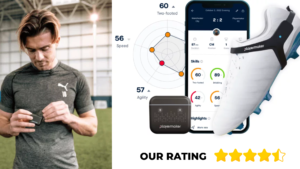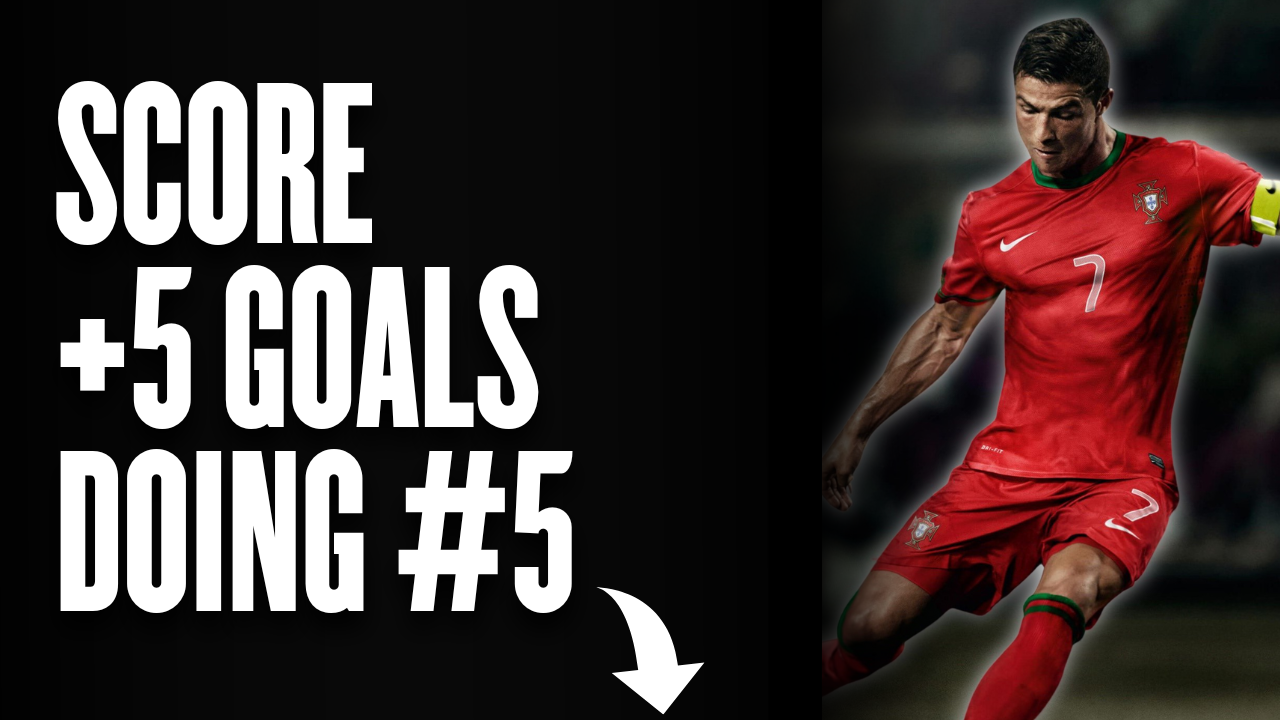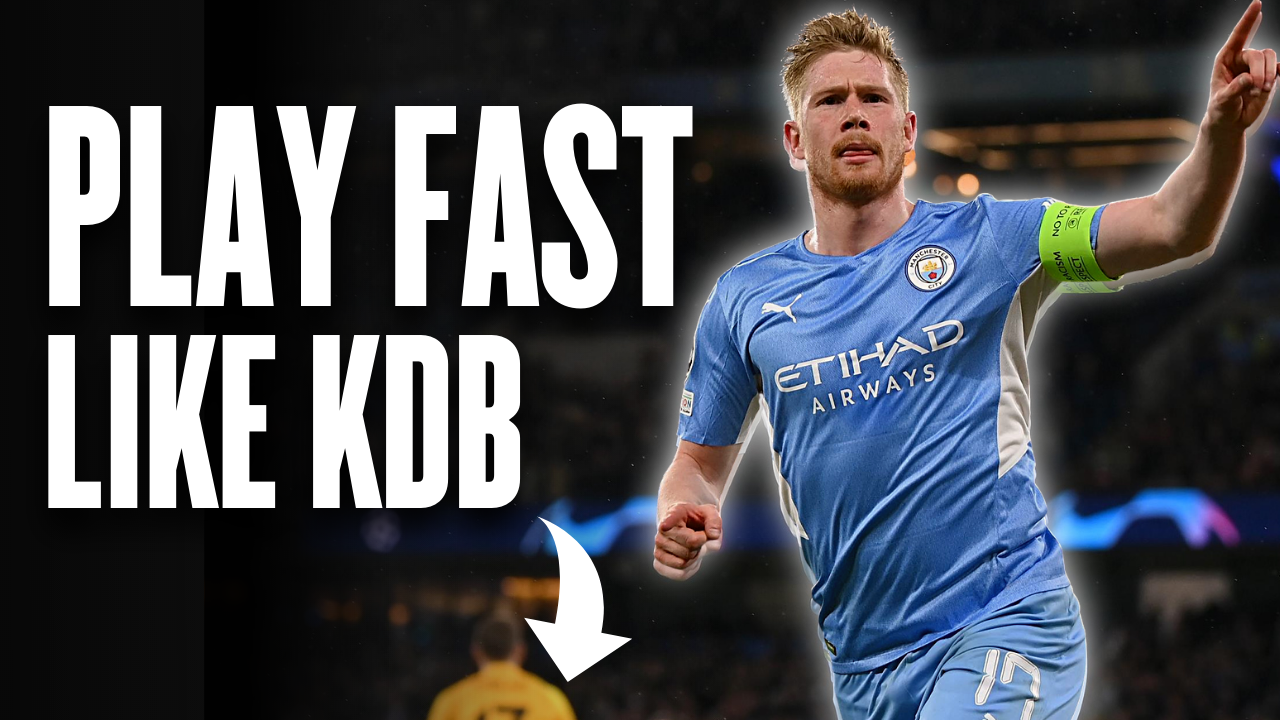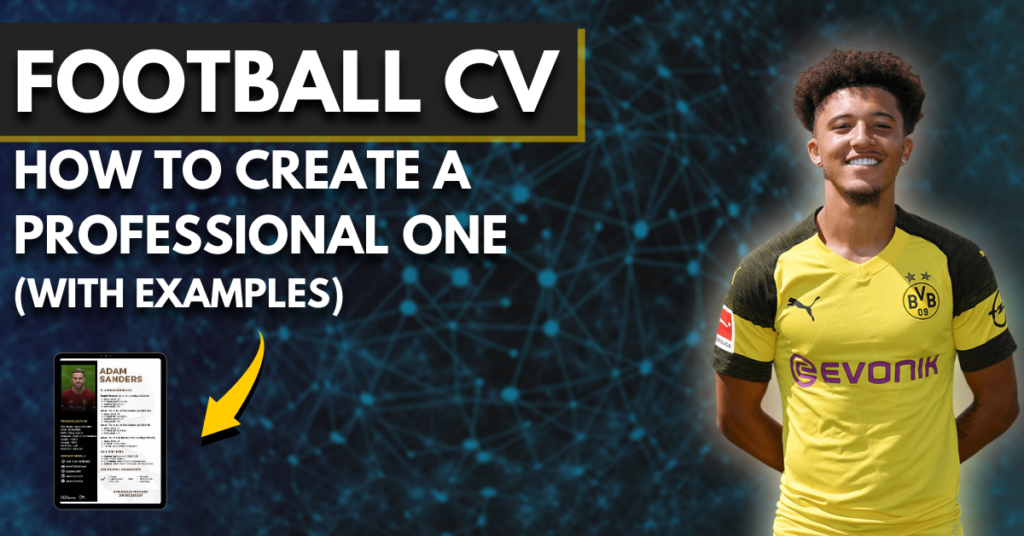
If you’re amongst the 68% of players in our Instagram audience that hasn’t got a football CV, I REALLY don’t know what you’re doing.

In the modern-day and age that we live in, technology has an impact on all aspects of our life, including football. A properly structured, informative, well-written (& designed!) CV can help you expand your network to a whole new level and earn opportunities our football ancestors would envy.
In terms of competitiveness, the digital player marketing space isn’t oversaturated yet, with players deeply underestimating the power technology has in this part of the process. However, its growth is currently on the rise.
RELATED: This Is How To Network In The Modern Football World
WHAT IS A CV & HOW DO YOU WRITE A PROFESSIONAL FOOTBALL CV?
A football CV (Curriculum Vitae or Resume) basically is a summary of your football background and player profile that allows the person you’re networking with to get to know you better. These people include coaches, football agents/agencies, general managers, etc. It’s really important for you to keep it short, yet informative. You’re not applying for a regular job. You’re talking to busy football people. So make sure you include all the necessary information, such as;
- Basic Personal and Player Information
- Football-Specific Profile Picture
- Playing Experience and Team Achievements
- Personal Achievements
- Strengths and Weaknesses of your Game
- Education/Languages (if needed)
- References
- Contact Details and Social Media

As Fiverr Affiliates we earn from qualifying purchases.
WHEN & WHY YOU NEED A FOOTBALL CV
Over the last decade, CVs have entered the world of player marketing. Every footballer needs a CV no matter their age and playing level. It is one of the primary networking tools you’ll need to expand your contact list within the football industry.
Having said that, are you a footballer that wants to play overseas? A high-school player that wants to get recruited into college? Or just another amateur/semi-pro/pro footballer that desperately wants to make that jump and #levelUP his/her career? A CV is a pre-requisite to networking.
It is your introduction tool to the football people you’re trying to connect with. Therefore, how you structure, write, and design your CV is key to making a good first impression.
The person sitting on the other end, reviewing your “application” expects a CV that is;
- Professionally Written & Formal
- Informative
- Honest
- Structured
- Easy to “Consume”
Many of you might be saying right now, “but I’m not a pro, how can I do all these things and stand out?”.
Listen, lads, you do not need to be a professional footballer in order to write/structure/design a quality football CV. You just need to check off all those bullet points we mentioned.
THE COMPLETE BREAK-DOWN OF A FOOTBALL CV
Now that we’ve got all that information out of the way, we’re going to go more in-depth into each point that we’ve mentioned. Let’s start off with the basic information.

*As an affiliate, I'm earning from qualifying purchases without any extra charges being placed on you.
1. Basic Personal and Player Information
This is a part of the CV you simply can’t override! Without those basic details about yourself, the person you’re talking to will not trust and work with you. So what does this include?
- Full Name
- Date of Birth
- Place of Birth
- Nationality
- Height
- Weight
- Preferred Foot
- Preferred Playing Position(s)
2. Football-Specific Profile Picture
A profile picture is something necessary for the whole process to make your CV feel and look professional. Ideally, you should have a photo with your team kit and your face clear and visible. Avoid pictures where you’re playing or at least those that don’t offer immediate face recognition. Take a look at the CV sample we’ve included to better understand what we’re talking about.
3. Playing Experience & Team Achievements
Another really important part of an informative football CV is the listing of your playing experience, aka the teams, you have played for in the last 3 to 4 seasons along with the statistics of your team for that specific season (finishing place, achievements, W/D/L, etc.). List the team stats/achievements, but try to emphasize the ones that support your playing position. For example, a center-back would focus on clean sheets and goals conceded.
If your team’s numbers weren’t quite good during a season, you might as well avoid listing these and just opt for the final ranking and total W/D/L.
4. Personal Achievements
In addition to your playing experience, you shall also add any personal achievements you might have, specific to football. Quality personal achievements will further increase the likelihood of a coach, agent/agency, or club wanting to work with you.
These personal achievements can include anything, from clean sheets, assists, or goals scored, to individual awards, call-ups for the national team, etc.
However, if you don’t have any, don’t worry! Just move on to the next step of the process.
5. Strengths and Weaknesses of your Game
In addition to the above, trust and honesty are two fundamental pieces of a relationship. The person you’re talking to most probably doesn’t know you as a player. Be open about your strengths and weaknesses, so these people know what they’re working with. There is no need to go super in-depth with these. Just mention 2-3 areas of your game that you perceive as your strengths and weaknesses. Your current coach/teammates can really help with that.
But please, make sure you’re honest about your game. Even if you lie and end up working with the person you’re networking with, they’ll eventually find out. So please, stop perceiving others as stupid.
6. Education and/or Languages
If you’re contacting college coaches or teams/coaches/agents/agencies overseas, it might be a good idea to include your educational background and/or the languages you speak.
In the first case, if you’re in the pursuit of a scholarship, your educational information is a prerequisite, so make sure to include that.

*As an affiliate, I'm earning from qualifying purchases without any extra charges being placed on you.
In regards to pursuing a career overseas, language barriers exist and coaches/agents are fully aware of them and the issues these might cause. Letting the other person know that you have an X level of understanding of their language might put the weight off their shoulders and actually spark their interest to work with you even more. Smashing that language barrier, even with super basic language skills can drastically increase your chances.
If you’re not after neither of the above, you can include this info for future opportunities if that is something that you’d be interested in (i.e. future opportunities in another country).
7. References
References are the people someone (coach/agent/agency) can refer to/contact to gain more in-depth and objective information about you. This person(s) should preferably be one of your (previous) coaches that you know will put in a good word for you if needed.
So, make sure to ask them for their permission before including their contact details in your CV. However, you might as well mention that you can provide references on request. At the end of the day, you’re networking in the football world, not applying for a spot in a high-level university.
8. Contact Details and Social Media
Do NOT forget your contact details! Although you’re sending them your CV via e-mail, it is absolutely necessary to include a variety of contact options where they can find you. This will make their job much easier and the whole contacting process much more direct and to the point.
Always include your cellphone number, your e-mail address (make sure it’s formal, containing only your name and some numbers if needed), and your social media handles (LinkedIn, Facebook, Instagram). Make the communication process as easy as possible!
As far as social media is concerned, consider updating your social media profiles and make them look as professional, and clean as possible. Avoid creating a social image that doesn’t go hand in hand with your career. Sure, a couple of photos with you and your buddies having a good time won’t hurt but try to minimize that or at least avoid extremes that can make someone shy off of a possible work relationship with you.
WHERE CAN I CREATE A FOOTBALL CV
Fortunately enough, technology provides us with all the necessary means to create something like a CV/Resume. There are literally endless places you can get a CV or create one for yourself.
You can either have someone create a CV for you or just design your own by using some really simple, free software.
So, if you want someone to create your CV, we suggest PlayerTape. PlayerTape is a Fiverr based service, that can create you a professional-looking CV/Resume and a Highlight Tape at a pretty reasonable price (prices start from 10$). Click here to get yours today!
On the other hand, you can also create a CV by yourself – for yourself! You can do this on various software, such as Google Docs, Canva, or any other design platform. There are also a TON of templates that are ready for you to fill out with all the details we mentioned and download.
FOOTBALL CV EXAMPLE
So now you’re wondering how a professional football CV looks like, right? Well here’s a sample one that our partners over at Player Tape made to help you out.
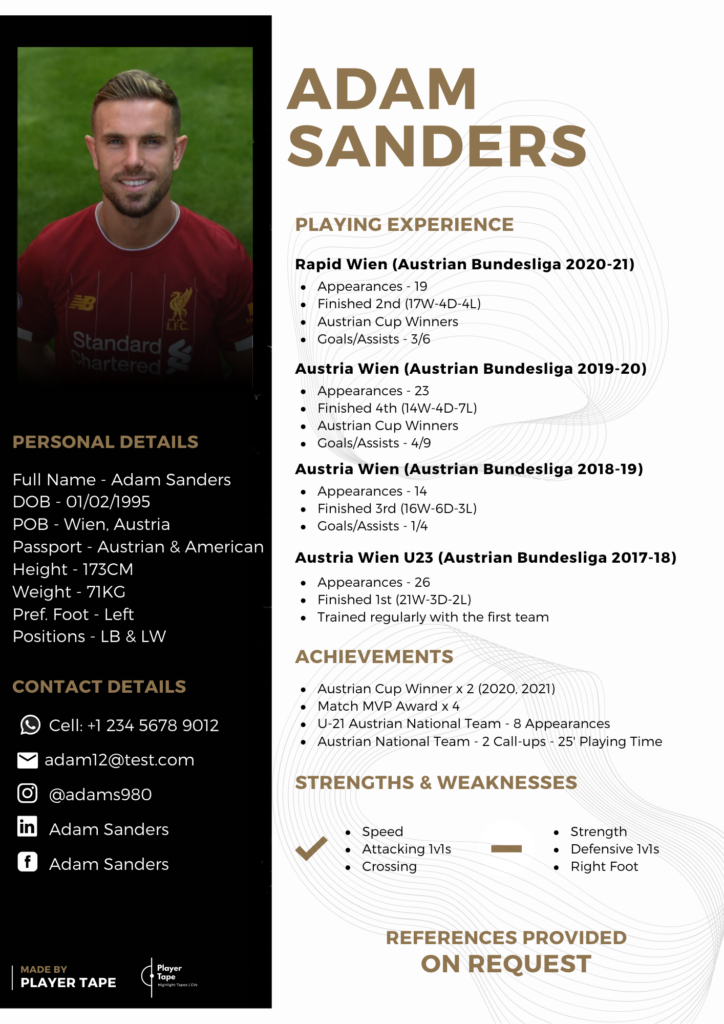
MISTAKES EVERYONE IS DOING
“Stop being flashy. Stop oversaturating your CV. Be quick. Be informative. End of story.”
Dani Infante, FIFA Licensed Agent
So many footballers are making (silly!) mistakes that either destroy or minimize their chances of working together with the person they network. For the sake of this section of the article, we asked FIFA Licensed Agent, Dani Infante, what mistakes he sees players making the most in regards to their CV.

As Fiverr Affiliates we earn from qualifying purchases.
Here’s what Dani Infante has to say.
“I hate it when I receive CVs that are flashy to the eyes but don’t contain BASIC information about the player himself, such as his nationality, age, height, playing position, playing level, and their full name. Yes, even their names! That’s absurd!”
“Other than this information, anything else comes in secondary. Even their address, their presentation paragraph, and their references, which I usually don’t read and use, are useless to me without the necessary details I mentioned. Stop being flashy. Stop oversaturating your CV. Be quick. Be informative. End of story.”
In addition to that, he says, “I also hate it when players provide fake playing experience and achievements. Most of the time, it is easy to spot those through the player’s highlight tape, or with just a little research on the internet.”
Thank you for those great points, Dani! If you want to connect with Dani Infante, check him out on Instagram @daninfante91. He’s an active football agent, currently based in Madrid, Spain.
Here’s an interview we did with Dani some while ago, which we’re 100% sure you’ll enjoy!
CONCLUSION
To conclude, a football CV/Resume is a prerequisite when it comes to networking in the football world. It’s your “football ID” that enables the person on the other end to get to know you.
The truth is that success isn’t guaranteed. In fact, you should expect a really small success rate in regards to the answers/interest you’re going to receive. Your job is to create a professional, informative, honest, and easy to consume CV that makes the person’s time reading it worth it.
Lastly, you shall remember this one key thing: all of those stats, the achievements, the accolades, etc. are earned on the pitch and delivered on game-day. Not through a piece of (digital) paper.
If you liked this article, we’re sure you’ll also enjoy these…
- This Is How To Network In The Modern Football World
- Soccer/Football Highlight Tape – This Is The Only Guide You’ll Need
- Football Cover Letter – This Is What You’re Doing Wrong!


